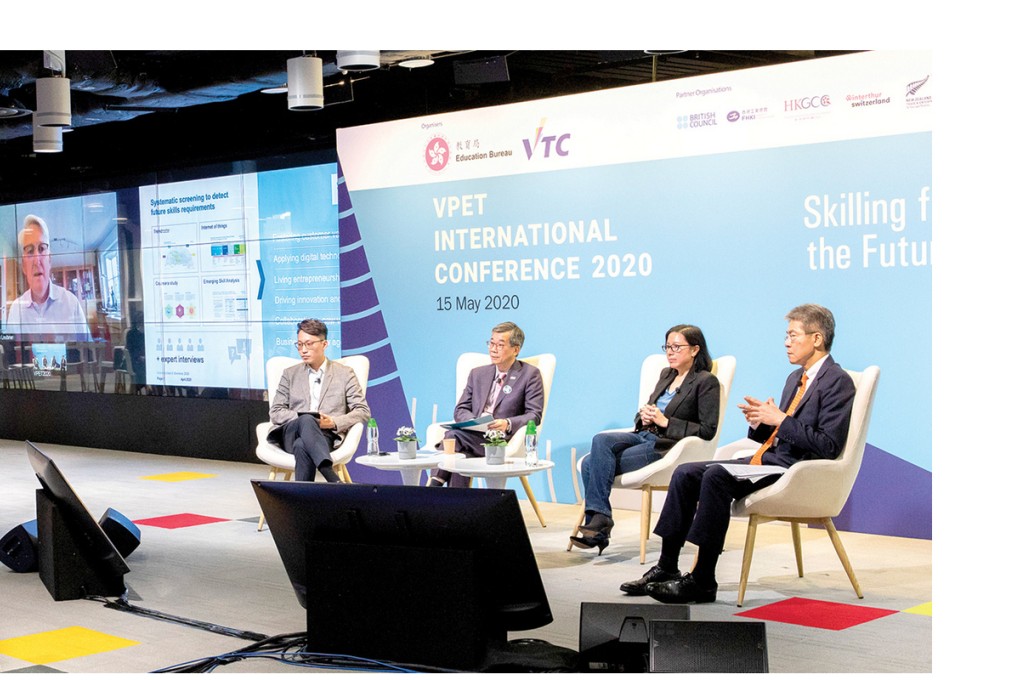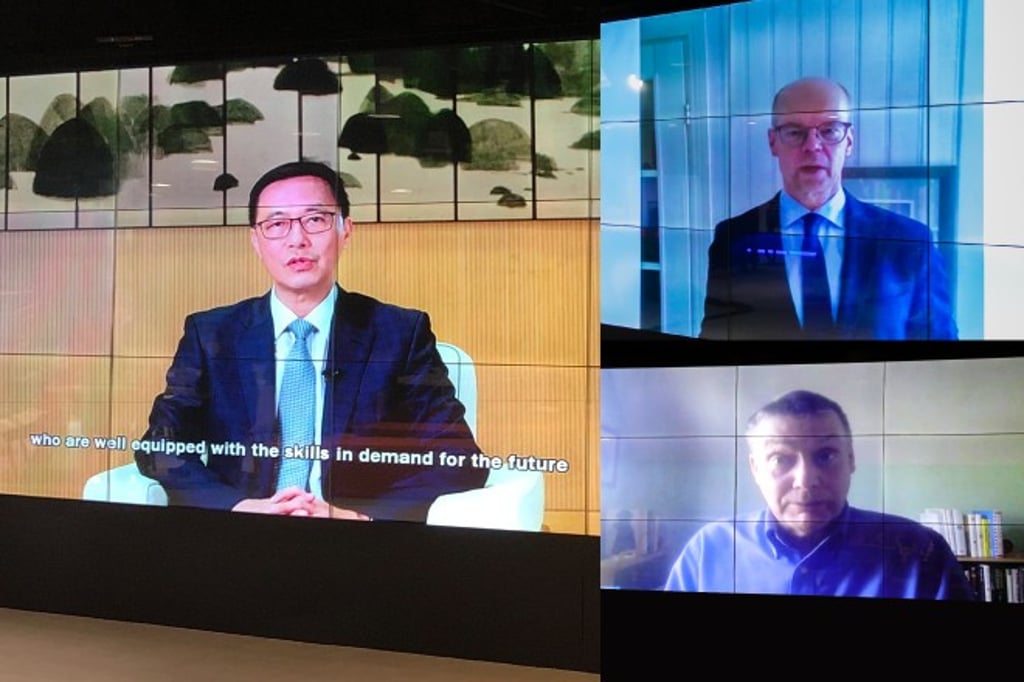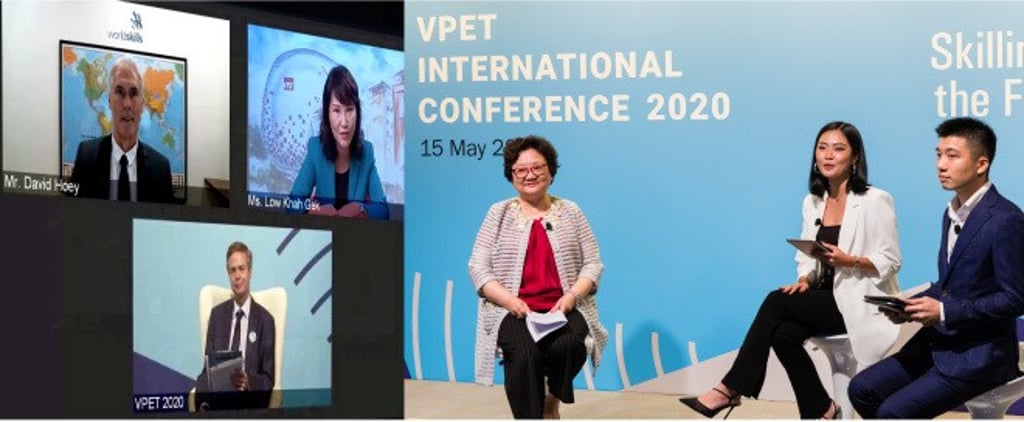First digital VPET international conference in Hong Kong
When technology and vision meet to set sights on skilling future-ready talent

[Sponsored Article]
The rise of new technologies and innovation is reshaping the future of work and the kinds of skills needed by those in the workforce. To cope with these changes, modern-day Vocational and Professional Education and Training (VPET) plays a key role in empowering today’s youth to become tomorrow’s talent. Hosted by the Education Bureau (EDB) and the Vocational Training Council (VTC) on May 15, the VPET International Conference 2020 featured 25 experts and speakers from Europe, America, Asia and Hong Kong – all exploring the issues surrounding the future of VPET and skills development.
Themed “Skilling for the Future”, VPET International Conference 2020 made use of the latest technology to provide a borderless platform and engage viewers from 50 countries to explore ideas on VPET and skills development in the new age, garnering over 10,000 online views.
In his opening remarks, Mr Kevin Yeung, Secretary for Education of the HKSAR Government, addressed the conference, “To meet the human resources needs of the ever-evolving economy, it is of paramount importance to ensure an adequate supply of talent who are well equipped with the skills in-demand for the future, which I refer to as applied skills to integrate different knowledge, skills, values, and attitudes. In this regard, VPET can provide students with a dynamic learning experience, integrating practical training at the workplace with the acquisition of generic soft skills and technological acumen.”

VPET grooms applied talent for the future
One of the keynote speakers, Professor Sir Chris Husbands, Vice-chancellor of Sheffield Hallam University, spoke of the practical steps to gear up education systems to better respond to change. A key step in the response was putting individual learners at the centre and preparing them for challenges ahead. Mr Olli-Pekka Heinonen, another keynote speaker and Director General of the Finnish National Agency for Education, stated that educators should give students “a compass” to navigate their way to the future. He also added that having the right values, attitudes and characters would help students adapt to and succeed in the changing contexts.
As digital technologies become increasingly sophisticated at doing productive work, knowledge and expertise will no longer be singled out as the human competitive advantage in the workplace. In the plenary session “Applied Education & Future Skills in the Digital Era”, speakers from different parts of the world all agreed that young people needed to master combinatorial skillsets. Professional and digital techniques, communication and collaboration competencies, and innovation and problem-solving capabilities were the core elements among them. Mr Andrew Chong, Chairman of the Institute of Technical Education, Singapore and Dr Sean Gallagher, Director of Centre for the New Workforce at Swinburne University of Technology, Australia cited their respective Work-Study Diploma programmes and apprenticeship training co-designed with industry partners as the strategic ways to forge ahead. They created a triple win for students, employers and educational institutes.

Multilateral collaboration – the key to enhancing workplace learning
Workplace learning has become a major part of applied education for the 21st century workforce. Learning-integrated work, on the one hand, provides new talent for corporations. On the other hand, it equips learners with job-ready skills. In Hong Kong, the VTC has partnered with institutions and corporations such as the Electrical and Mechanical Services Department, Jardine Engineering Corporation (JEC) Limited, Scania (Hong Kong) Limited, HAECO Hong Kong, JP Morgan Chase, IBM Corporation and Siemens. These partnerships are focused on grooming talent through various workplace training, apprenticeship schemes and collaborative projects.
Skills Change Lives
Mr David Hoey, Chief Executive Officer of WorldSkills International in his sharing, emphasised that skills changed the lives of young people around the globe and were important in achieving economic growth and personal success. Various VTC graduates made their own cases for how VPET helped them master applied skills and change their lives. Mr Robo Yeung, R&D Engineer at a multinational corporation, affirmed that workplace training had reinforced his capability in solving complex problems. As for Ms Pearl So, Regional Representative for Asia of WorldSkills Champions Trust, skills training had opened up ample opportunities for personal growth and development, leading her to a professional career in exhibition design.

Other young minds at the International STEM Students’ Forum 2020 on 16 May echoed the impact of skills acquisition on their lives. Ms Joanna Kwok, a VTC graduate and the first woman in Hong Kong to qualify as a chief engineer in the marine sector, marveled that STEM skills had led her to once-in-a-lifetime experiences and a life track very different from the norm. As for Ms Jodie Howlett, alumnus from Sheffield Hallam University and named as one of the UK’s Top 50 Women in Engineering in 2017, STEM skills paved the way for her international career, instilling confidence in her to change the world for the better.
On skilling talent for the future, Mr Tony Tai, Chairman of the VTC concluded that aside from digital skills, youth also needed to possess professional and social skills and build appropriate attitudes to steer the industries and society forward on a longer-term basis.